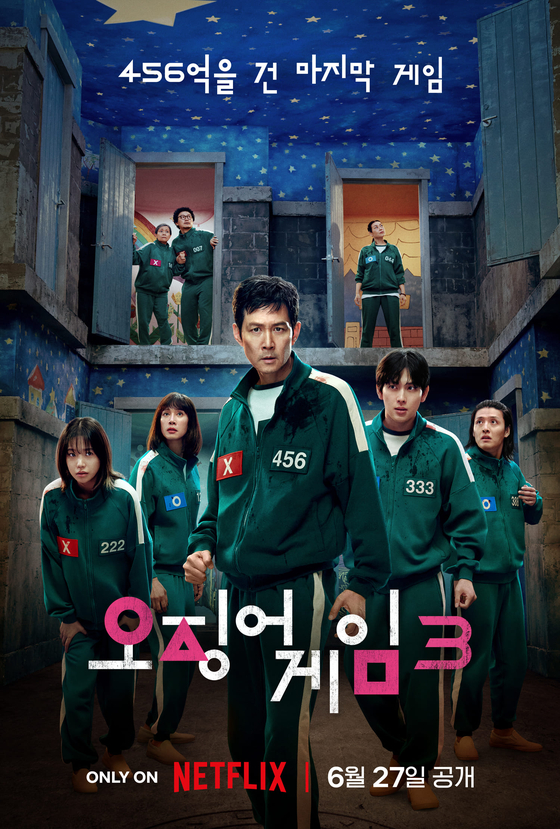Strategic investment in the Korean drama industry, now is the 'golden time' [Entertainment Law Issues by Attorney Yoo Lihae]

'Squid Game Season 3' poster. Photo by Netflix.
This crisis is largely due to rising production costs. The cost of producing dramas, which was around 3-4 billion won per episode in the mid-2010s, has now increased to 10-15 billion won per episode, with some works costing over 30 billion won per episode. Amid a significant rise in lead actors' fees due to the entry of global OTTs into the domestic market, the broadcasting advertising market has also shrunk, making it difficult for broadcasters to secure profitability. As a result, they have reduced their drama programming. Meanwhile, domestic OTTs that rely solely on Korean subscribers have increased their focus on producing less costly variety shows. If this trend continues and the drama distribution market solidifies into a Netflix-dominated system, platform dependence will inevitably deepen due to weakened negotiation power.
The problem is that K-dramas have a significant impact on other industries beyond the cultural industry. The popularity of Korean dramas has boosted the nation's image, leading to an increase in foreign tourists visiting Korea. Just like how cosmetics featured in "Crash Landing on You" and sugar pulling seen in "Squid Game" became topics of discussion overseas, Korean dramas greatly influence sales in consumer goods industries such as beauty, fashion, and food. In this situation, the contraction of the drama industry not only threatens the survival of production companies that missed out on broadcasting opportunities on Netflix and supporting actors with fewer acting opportunities, but it could also jeopardize South Korea’s growth momentum.
On the other hand, there is also an increasing number of cases where large production companies, centered around their own IPs, sell broadcasting rights to broadcasters and global platforms respectively. Through this, they can recover most of the production costs, and if the Chinese market opens up, additional profits can be gained. This is also the most advantageous distribution structure that allows for future IP expansion. However, small and medium-sized production companies, which are struggling with rapidly increasing production costs, find themselves in a situation where they have to transfer the entire IP as it is, in order to secure programming and cover production costs.
Ultimately, it is a common opinion among drama industry stakeholders that there needs to be concentrated support for the Korean drama industry in order to overcome this issue. Just as laws such as the National Advanced Strategic Industry Act were established for the growth of industries like semiconductors and biotechnology, a new special law could also be enacted. Alternatively, policy funding support could be expanded by utilizing existing systems defined in the Basic Act on the Promotion of Cultural Industries. For instance, investment could be concentrated in the drama sector through funds such as the Ministry of Culture, Sports and Tourism’s mother fund cultural account, or the scale of cultural industry guarantees operated by credit guarantee funds could be significantly expanded to strengthen content production infrastructure. Long-term, the current proportion of cultural budget, which is only about 1.3%, should also be increased further.

Tving has launched a 'Double Pass' subscription that allows users to enjoy popular content from both platforms, Tving and Wave.
Securing the global competitiveness of Korean OTT platforms is also an important task. The merger discussions between Tving and Wavve, which have been underway since 2023, recently received conditional approval from the Fair Trade Commission. Through strategic integration, it is necessary to combine content investment capabilities and achieve economies of scale to enhance competitiveness. The growth of the FAST (Free Ad-supported Streaming TV) market, primarily in North America, presents an opportunity for Korea. Since high-quality content has already been significantly accumulated and global competitiveness has been proven, the government needs to support Korean platforms and content in overcoming institutional barriers for overseas expansion, and consider various distribution support measures such as supporting translation, dubbing, promotion, and other localization costs.
이재명 대통령은 취임사를 통해 ‘문화가 곧 국제 경쟁력이며, 적극적인 문화 예술지원으로 콘텐트의 세계 표준을 다시 쓸 문화강국으로 도약할 것’을 선언하였다. 세계시장에서 범죄, 스릴러 등 장르물을 통해 주목받은 한국 콘텐트는 ‘선재 업고 튀어’나 ‘폭싹 속았수다’ 등을 통해 전통적인 한국적 정서와 로맨스 코미디물도 글로벌 경쟁력을 가질 수 있음을 보여주었다. 한국 콘텐트는 앞으로도 다양한 서사와 형식을 통해 전 세계에서 공감대를 이루며 콘텐트 시장을 주도하게 될 것이고, 이는 결국 한국 경제 전반의 성장을 견인하는 긍정적인 선순환으로 이어지게 될 것이라 믿는다.
However, in order for the Korean cultural industry to continue to grow and leap forward as a cultural power, it is necessary to support the currently struggling drama industry through expanded policy funds and strategic financial assistance.

[Entertainment Law Issues by Attorney Yoon Hae-hyeong]
ⓒUD News(https://www.joongang.co.kr), unauthorized reproduction or redistribution prohibited
Post a Comment